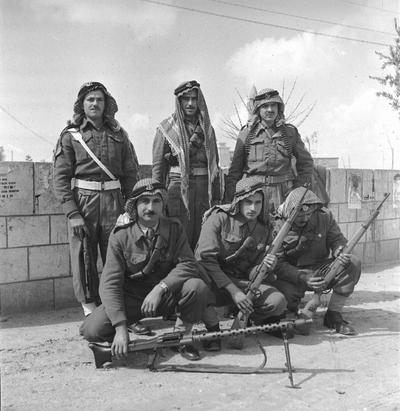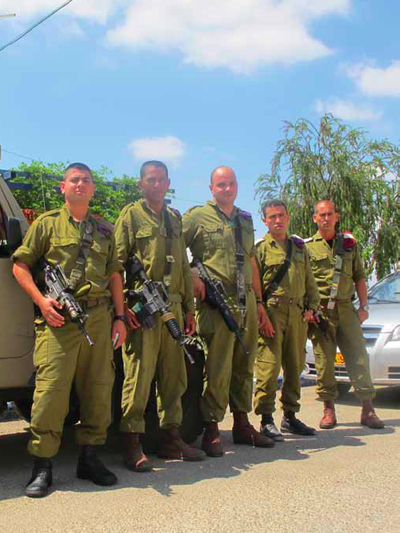- Joined
- Jul 10, 2008
- Messages
- 303
- Points
- 18
Hidden Current Affairs - Arab soldiers in the Israeli Army
adapted from an essay by Chanan Tigay : http://www.mcsweeneys.net/pages/the-special-populations-unit

Druze soldiers in the Israel Defense Forces, 1949.
From as early as six or seven years old, Bedouin boys learn that the earth is everything. Sent into the field to graze their family’s livestock, young Bedouin find themselves faced with safeguarding their families’ entire livelihoods. This, it turns out, provides them the perfect training for life as army trackers.
“As kids, we didn’t know what a computer was,” Lt. Col. Majdi Mazareib, chief tracker of Israel’s Northern Command, tells me in an office so spare it’s clear he rarely visits. With his bald head, dark skin, and intense bearing, he could have been mistaken for a pharaoh in another eon.
“We walked barefoot sometimes; most of the time, maybe,” he says. “You survive in the field. You don’t have any limits. You don’t have a Polish mother who calls you in at one o’clock and says, ‘Come eat.’”
As far back as he can remember, Mazareib hunted. He built traps to catch birds for his family. He learned how to raise bees. “The minute you go out into the field, you hear the noises, you touch the plants, you touch the rocks. It’s not a formal course, not like your parents send you to a class. It comes naturally,” he says. “At the same time we had a herd of sheep, and for part of each year we’d go down into the valley with them. We’d be in the fields of the Jezreel Valley for months. We slept in a tent. When you go out with a herd, you’re a leader. Imagine a Bedouin boy, eight years old, his family’s business placed in his hands. It’s a lot of responsibility. You have to make sure the herd eats properly, drinks properly, that you don’t lose any. Now, what’s the connection between being a shepherd and a tracker?”
“It begins with the fact that while you’re watching the herd, your friends come and you start playing with them,” he says. “While you’re playing, you’re not paying attention, and the herd keeps going, and you lose them. Then you have to search for them—and that’s when you start developing the senses: to run, to search, to know. That’s a kind of tracking. And that can be suitable for the army.”
Jewish soldiers describe Bedouin trackers as wizards of a sort. Oftentimes, a tracker can’t point to exactly what it is that has raised his antennae; it’s just a sense. In other instances, very specific signs lead to a particular discovery. Soldiers regale me with stories of trackers who, having spotted a series of footprints etched in the border sand, go on to (accurately) tell their officers how many people have infiltrated; how old they were; how much they weighed; whether they were men or women; and, in some cases, that one had a limp, or was pregnant. Some infiltrators wear specially fitted shoes that slip on backward, so it appears they are leaving Israel rather than entering; trackers can spot this ruse with ease, much as they can tell when an infiltrator has fastened sheepskin to the soles of his feet in an effort to leave no discernible prints at all.
Mazareib tells a story about would-be terrorists caught crossing into Israel from Egypt. Under interrogation, the men admitted that they had been most worried about covering their footprints, citing the IDF’s trackers as their greatest concern. “If they see four Jeeps, it doesn’t frighten them,” Mazareib says. “But if they see one tracker, following their tracks on foot, that drives them crazy. You can neutralize every piece of technology eventually. There’s no replacement for a tracker.”

Arab trackers at Biranit, a military base perched on the border
with Lebanon. Several were fasting for Ramadan.
Trackers also die in higher proportions than other soldiers. When they are working with a combat unit, they travel at the front, ahead of the other men. “The fact that I’m at the head of the force, if I go with the naval commandos or Sayeret Matkal”—an elite recon unit—“that means I’m no less good than they are,” Mazareib says. “There’s sometimes a price, when an explosive is detonated, or there’s sniper fire and trackers are killed. But there’s also an advantage. If I trust someone else to go ahead of me, he can lead me into mines, and I can be killed then, too. So I prefer to go at the front.”
adapted from an essay by Chanan Tigay : http://www.mcsweeneys.net/pages/the-special-populations-unit

Druze soldiers in the Israel Defense Forces, 1949.
From as early as six or seven years old, Bedouin boys learn that the earth is everything. Sent into the field to graze their family’s livestock, young Bedouin find themselves faced with safeguarding their families’ entire livelihoods. This, it turns out, provides them the perfect training for life as army trackers.
“As kids, we didn’t know what a computer was,” Lt. Col. Majdi Mazareib, chief tracker of Israel’s Northern Command, tells me in an office so spare it’s clear he rarely visits. With his bald head, dark skin, and intense bearing, he could have been mistaken for a pharaoh in another eon.
“We walked barefoot sometimes; most of the time, maybe,” he says. “You survive in the field. You don’t have any limits. You don’t have a Polish mother who calls you in at one o’clock and says, ‘Come eat.’”
As far back as he can remember, Mazareib hunted. He built traps to catch birds for his family. He learned how to raise bees. “The minute you go out into the field, you hear the noises, you touch the plants, you touch the rocks. It’s not a formal course, not like your parents send you to a class. It comes naturally,” he says. “At the same time we had a herd of sheep, and for part of each year we’d go down into the valley with them. We’d be in the fields of the Jezreel Valley for months. We slept in a tent. When you go out with a herd, you’re a leader. Imagine a Bedouin boy, eight years old, his family’s business placed in his hands. It’s a lot of responsibility. You have to make sure the herd eats properly, drinks properly, that you don’t lose any. Now, what’s the connection between being a shepherd and a tracker?”
“It begins with the fact that while you’re watching the herd, your friends come and you start playing with them,” he says. “While you’re playing, you’re not paying attention, and the herd keeps going, and you lose them. Then you have to search for them—and that’s when you start developing the senses: to run, to search, to know. That’s a kind of tracking. And that can be suitable for the army.”
Jewish soldiers describe Bedouin trackers as wizards of a sort. Oftentimes, a tracker can’t point to exactly what it is that has raised his antennae; it’s just a sense. In other instances, very specific signs lead to a particular discovery. Soldiers regale me with stories of trackers who, having spotted a series of footprints etched in the border sand, go on to (accurately) tell their officers how many people have infiltrated; how old they were; how much they weighed; whether they were men or women; and, in some cases, that one had a limp, or was pregnant. Some infiltrators wear specially fitted shoes that slip on backward, so it appears they are leaving Israel rather than entering; trackers can spot this ruse with ease, much as they can tell when an infiltrator has fastened sheepskin to the soles of his feet in an effort to leave no discernible prints at all.
Mazareib tells a story about would-be terrorists caught crossing into Israel from Egypt. Under interrogation, the men admitted that they had been most worried about covering their footprints, citing the IDF’s trackers as their greatest concern. “If they see four Jeeps, it doesn’t frighten them,” Mazareib says. “But if they see one tracker, following their tracks on foot, that drives them crazy. You can neutralize every piece of technology eventually. There’s no replacement for a tracker.”

Arab trackers at Biranit, a military base perched on the border
with Lebanon. Several were fasting for Ramadan.
Trackers also die in higher proportions than other soldiers. When they are working with a combat unit, they travel at the front, ahead of the other men. “The fact that I’m at the head of the force, if I go with the naval commandos or Sayeret Matkal”—an elite recon unit—“that means I’m no less good than they are,” Mazareib says. “There’s sometimes a price, when an explosive is detonated, or there’s sniper fire and trackers are killed. But there’s also an advantage. If I trust someone else to go ahead of me, he can lead me into mines, and I can be killed then, too. So I prefer to go at the front.”



